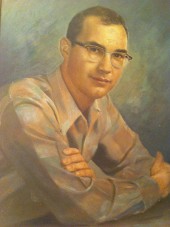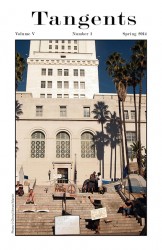 April 10, 2014
April 10, 2014
The reborn Tangents magazine is as good under the new editor, C. Todd White, and writers as it ever was. Don Slater and other editors would be proud of this issue (Vol. V #1, Spring 2014).
The editorial says why we need to continue the work of ONE/IGLA/HIC. The memorial to co-founder Jim Schneider tells how we struggled to continue the work after the loss of the main one who inspired us, Don Slater.

The article on Jim Kepner and his Little Blue Books is a good explanation of how an archive works. My review of Tracy Baim’s “history of the gay press” (Gay Press, Gay Power) explains how the history has been preserved by our community media.
There is a strange and interesting “exchange of views of our history and thinking” in the two separate yet almost conversational essays between Stephanie Donald’s memory of Jack Nichols and Craig Schoonmaker’s memory of the movement and his views on terminology — and it seems to me this discussion is as alive today as it was in the era discussed.
Listen to the views on marriage of Jack and Craig:
Jack’s work on gay rights was hard work for full equality. Marriage equality was never a consideration for him because he felt that getting married, at least for men (and he felt for women, too, but thought the “nesting instinct” was harder to break in the females) was taking the “sexual” out of “homosexual” and forcing gay rights into heterosexual assimilation, which would destroy gay and lesbian history and culture.
While, in a sense, Don Slater would say some of this, he did NOT agree that we had a culture—and did not want us in a ghetto.
But, here is Craig:
I can say, however, that I am hostile to some of the notions of people who fought not for openness but for “privacy” (shame) and who advocated the silly notion that homosexuality is only a point on a “continuum” and related notions that we must not narrow ourselves to gay—only but must always see ourselves first and foremost as “human.”
Again, Don would not agree with most of his thinking. We never understood why people could not grasp the obvious need to protect our privacy—something now heard when discussing the government listening to our cell phone and email discussions. Why would asking for privacy mean we are ashamed?
As to terminology, Craig says the word “queer” is bad, yet many young LGBT people say it is better than a long list of letters. But the issue is alive and was an article in The New York Times in the last week or two—saying only the word gay is acceptable.
So reading Tangents is reading what is in the current discussion of issues of homosexuality.
So the Homosexual Information Center is continuing its work of preserving history but also speaking to today’s issues. Again, the pioneers of this movement would be eagerly reading this issue and joining the discussion.

